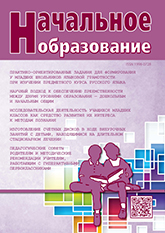Moskva, Moscow, Russian Federation
Russian Federation
GRNTI 14.15 Система образования
GRNTI 14.25 Общеобразовательная школа. Педагогика общеобразовательной школы
The article considers the directions of the modern European professional pedagogical education, focused on improving its quality in order to ensure the full development of children at the initial stage of education. The conceptual provisions of professional competence of teachers in the field of preschool and primary school education are indicated. The components of the teacher’s professional competence models are described, which are developed on the basis of the European Qualifications Framework (EQF) and take into account the competence approach implemented in the educational practice of European countries. Particular attention is paid to the development of competency parenting in the implementation of the concept of “Lifelong learning”. The main scientific judgments about modern parenthood, which determine the models of family and school interaction existing abroad, are summarized.
European education, the initial stage of training; competence approach; teacher competence; “European qualification frameworks” in the field of vocational teacher education; parental competence; the concept of “Lifelong learning”; interaction of educational institutions, teachers and parents in the educational system of Europe.
1. Danilova I.S., Orekhova E.Ya. Aktualizatsiya problemy roditel’stva v sovremennom obshchestve [Actualization of the problem of parenting in modern society]. European Social Science Journal [European Social Science Journal]. 2016, I. 2, pp. 415-421.; EDN: https://elibrary.ru/WNHSOP
2. Berger M. L’échec de la protection de l’enfance. Paris, Dunod, 2003. 280 p.
3. Demeuse M., Frandji D., Greger D. Les politiques d’éducation prioritaire en Europe. Quel devenir pour l’égalité scolaire? / M. Demeuse, D. Frandji, D. Greger [et al]. Tome 2. Lion: ENS Éditions, 2014. 421 p.
4. European Commission (2005). Common European Principles for Teacher Competences and Qualifications. Retrieved 28.01.2011 [Elektronnyy resurs]. Available at: http://ec.europa.eu/education/policies/2010/doc/principles_en.pdf (accessed 06 March 2019).
5. European Commission. Education and Training 2010 - The Success of the Lisbon Strategy Hinges on Urgent Reforms Brussels, 2004 [Elektronnyy resurs]. Available at: http://ec.europa.eu/education/policies/2010/doc/jir_council_final.pdf (accessed 06 March 2019).
6. European Commission (2007). Improving the quality of teacher education. Retrieved 28.01.2011 [Elektronnyy resurs]. Available at: http://ec.europa.eu/education/com392_en.pdf (accessed 06 March 2019).
7. European Commission (2007). Key Competences for Lifelong Learning - A European Framework. Retrieved 28.01.2011 [Elektronnyy resurs]. Available at: http://ec.europa.eu/dgs/education_culture/publ/pdf/ll-learning/keycomp_en.pdf (accessed 06 March 2019).
8. European Commission (2010). Lisbon Strategy evaluation document. Commission staff working document. Retrieved 28.01.2011 [Elektronnyy resurs]. Available at: http://ec.europa.eu/europe2020/pdf/lisbon_strategy_evaluation_en.pdf (accessed 06 March 2019).
9. European Commission (2005). Towards a European Qualifications Framework for lifelong learning. Commission Staff Working Paper. Retrieved 28.01.2011 [Elektronnyy resurs]. Available at: http://ec.europa.eu/education/policies/2010/doc/consultation_eqf_en.pdf (accessed 06 March 2019).
10. Glasman D. Qu’est-ce qui soutient les élèves? Dispositifs et mobilisations dans divers établissements secondaires. Lyon: Centre Alain Savary-IFE-ENS de Lyon. 2016. 103 p.
11. OECD (2015), Regards sur l’éducation 2015: Les indicateurs de l’OCDE, OECD Publishing, Paris [Elektronnyy resurs]. Available at: https://www.oecd-ilibrary.org/education/regards-sur-l-education-2015_eag-2015-fr (accessed 06 March 2019).






